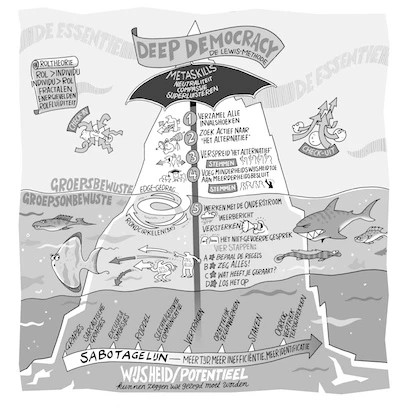Deep Democracy
I had been working with groups for over 15 years, when I was introduced to the methodology of Deep Democracy. It was a technique that immediately fit me like a glove, and I’ve been actively working with it since.
What is Deep Democracy?
Deep democracy is a methodology that helps groups make sustainable and inclusive decisions. It finds its origin in South Africa with its founders Greg and Myrna Lewis.
When a group makes a decision, what usually happens is that there are a couple of dominant voices, that make themselves heard very easily. Alternative voices are then easily pushed aside and can disappear ‘under water’, in spite of the fact that they are often of great value to the group.
Decision-making is only partly a rational process. If a group makes a decision that process is also impacted by who like each other and who don’t, the individual agendas of each of the members, earlier experiences, etcetera. Deep Democracy helps bring up all the rational arguments, as well as the more emotional and relational undercurrent.
Why deep democracy?
If we don’t make ourselves heard, or if we speak up, but nobody listens, we tend to find alternative ways of expressing our point of view; we make jokes, gossip, oppose, make excuses, etcetera. This creates a dynamic that makes it increasingly difficult for us to be effective as a group. Decisions in which the voice of the minority has been included tend to boast more commitment and ownership and are often also qualitatively better decisions.
Who can benefit from Deep Democracy?
Deep Democracy is an essential tool for anyone working with groups. It gives practical tools for facilitating open, courageous conversations and for making strong and sustainable decisions. It can also be used as a leadership tool to make more effective use of the different voices within oneself. We all have certain internal voices that we are more comfortable with and/ or more used to showing to the outside world (for instance our rational voice, our responsible or strong voice, or maybe our creative voice) and other voices that we under-utilize.
Level 1 - You will learn different techniques for having meaningful conversations (i.e. check-in, soft shoe shuffle, throwing arrows) and you will practice facilitating with this technique as a neutral facilitator. Also, you will work on important ‘meta-skills’ (key-leadership-skills) as neutrality, compassion and super-listening.
Level 2 - You will learn to apply the technique from different roles; as a leader, as a participant and as an outside facilitator. You will also deepen your understanding of how ranking and power influence group-processes and you will learn how to facilitate a ‘Let’s talk’ (model for transformational conflict).¶
Level 3 - It’s often at a time when we need to make collective decisions, that our differences become more visible and (latent) conflict surfaces. In this course you will learn how to facilitate courageous conversations in the midst of conflict.
Creating and holding space - Strong and effective skills-based training for anyone who wants to learn how to create a context in which people feel safe and invited to express their feelings and opinions. Especially at times when conflicts become heated, confusion often arises. In these two days you will learn how to deal with that tension and even how you can use it to strengthen relationships.
